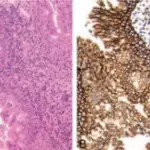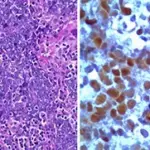Nasopharyngeal carcinoma is a tumor is categorized by a typical geographic distribution, in anatomic association to lymphoid tissue.
What is the Pathology of Nasopharyngeal Carcinoma?
The pathology of nasopharyngeal carcinoma is:
-Etiology: The cause of nasopharyngeal carcinoma is the environmental factors and infection with Epstein‐Barr virus.
-Genes involved: None.
-Pathogenesis: The sequence of events that lead to nasopharyngeal carcinoma proliferation of malignant cells.
-Histology: The histology associated with nasopharyngeal carcinoma shows non-keratinizing squamous cell carcinoma and undifferentiated carcinoma.
How does Nasopharyngeal Carcinoma Present?
Patients with nasopharyngeal carcinoma typically the male-to-female ratio is approximately 2:1 present at age range of 50-60 years. The symptoms, features, and clinical findings associated with nasopharyngeal carcinoma include bleeding, nasal obstruction, and nasal discharge. Ear infection, and tinnitus. Neck swelling and headaches may also be present.
How is Nasopharyngeal Carcinoma Diagnosed?
Nasopharyngeal carcinoma is diagnosed through Laboratory studies: Complete blood cell count, Epstein-Barr virus titers. chemistry profile. Imaging; positron emission tomography imaging, magnetic resonance imaging, CT scanning, and bone scans.
How is Nasopharyngeal Carcinoma Treated?
Nasopharyngeal carcinoma is treated through medical care, radiation, and chemotherapy. Surgical intervention is limited to a biopsy tissue analysis.
What is the Prognosis of Nasopharyngeal Carcinoma?
The prognosis of nasopharyngeal carcinoma is fair as those treated with radiotherapy have a 40-50% survival rate.



